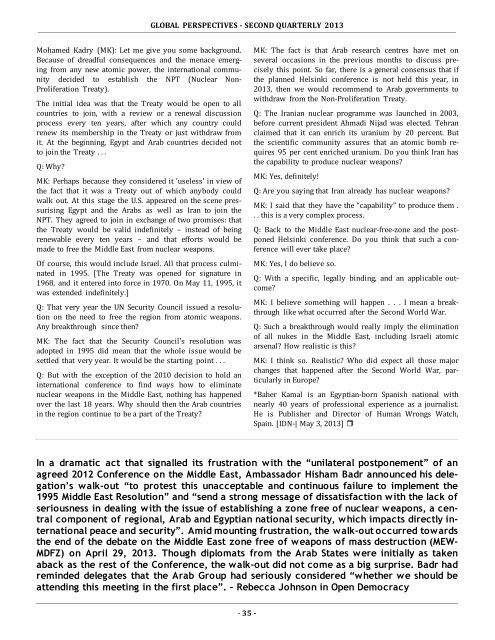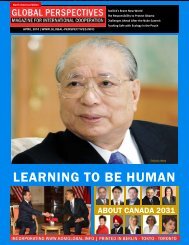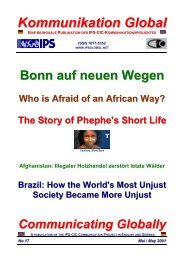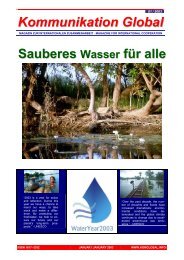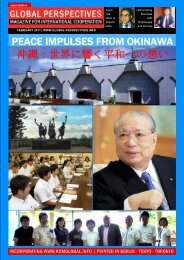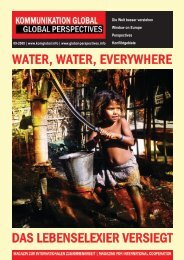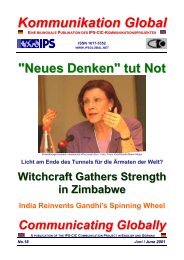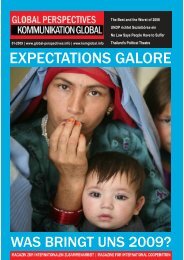GLOBAL PERSPECTIVES | Second Quarterly 2013 â North America ...
GLOBAL PERSPECTIVES | Second Quarterly 2013 â North America ...
GLOBAL PERSPECTIVES | Second Quarterly 2013 â North America ...
You also want an ePaper? Increase the reach of your titles
YUMPU automatically turns print PDFs into web optimized ePapers that Google loves.
<strong>GLOBAL</strong> <strong>PERSPECTIVES</strong> - SECOND QUARTERLY <strong>2013</strong><br />
Mohamed Kadry (MK): Let me give you some background.<br />
Because of dreadful consequences and the menace emerging<br />
from any new atomic power, the international community<br />
decided to establish the NPT (Nuclear Non-<br />
Proliferation Treaty).<br />
The initial idea was that the Treaty would be open to all<br />
countries to join, with a review or a renewal discussion<br />
process every ten years, after which any country could<br />
renew its membership in the Treaty or just withdraw from<br />
it. At the beginning, Egypt and Arab countries decided not<br />
to join the Treaty . . .<br />
Q: Why?<br />
MK: Perhaps because they considered it 'useless' in view of<br />
the fact that it was a Treaty out of which anybody could<br />
walk out. At this stage the U.S. appeared on the scene pressurising<br />
Egypt and the Arabs as well as Iran to join the<br />
NPT. They agreed to join in exchange of two promises: that<br />
the Treaty would be valid indefinitely – instead of being<br />
renewable every ten years – and that efforts would be<br />
made to free the Middle East from nuclear weapons.<br />
Of course, this would include Israel. All that process culminated<br />
in 1995. [The Treaty was opened for signature in<br />
1968, and it entered into force in 1970. On May 11, 1995, it<br />
was extended indefinitely.]<br />
Q: That very year the UN Security Council issued a resolution<br />
on the need to free the region from atomic weapons.<br />
Any breakthrough since then?<br />
MK: The fact that the Security Council's resolution was<br />
adopted in 1995 did mean that the whole issue would be<br />
settled that very year. It would be the starting point . . .<br />
Q: But with the exception of the 2010 decision to hold an<br />
international conference to find ways how to eliminate<br />
nuclear weapons in the Middle East, nothing has happened<br />
over the last 18 years. Why should then the Arab countries<br />
in the region continue to be a part of the Treaty?<br />
MK: The fact is that Arab research centres have met on<br />
several occasions in the previous months to discuss precisely<br />
this point. So far, there is a general consensus that if<br />
the planned Helsinki conference is not held this year, in<br />
<strong>2013</strong>, then we would recommend to Arab governments to<br />
withdraw from the Non-Proliferation Treaty.<br />
Q: The Iranian nuclear programme was launched in 2003,<br />
before current president Ahmadi Nijad was elected. Tehran<br />
claimed that it can enrich its uranium by 20 percent. But<br />
the scientific community assures that an atomic bomb requires<br />
95 per cent enriched uranium. Do you think Iran has<br />
the capability to produce nuclear weapons?<br />
MK: Yes, definitely!<br />
Q: Are you saying that Iran already has nuclear weapons?<br />
MK: I said that they have the “capability” to produce them .<br />
. . this is a very complex process.<br />
Q: Back to the Middle East nuclear-free-zone and the postponed<br />
Helsinki conference. Do you think that such a conference<br />
will ever take place?<br />
MK: Yes, I do believe so.<br />
Q: With a specific, legally binding, and an applicable outcome?<br />
MK: I believe something will happen . . . I mean a breakthrough<br />
like what occurred after the <strong>Second</strong> World War.<br />
Q: Such a breakthrough would really imply the elimination<br />
of all nukes in the Middle East, including Israeli atomic<br />
arsenal? How realistic is this?<br />
MK: I think so. Realistic? Who did expect all those major<br />
changes that happened after the <strong>Second</strong> World War, particularly<br />
in Europe?<br />
*Baher Kamal is an Egyptian-born Spanish national with<br />
nearly 40 years of professional experience as a journalist.<br />
He is Publisher and Director of Human Wrongs Watch,<br />
Spain. [IDN-| May 3, <strong>2013</strong>] <br />
In a dramatic act that signalled its frustration with the “unilateral postponement” of an<br />
agreed 2012 Conference on the Middle East, Ambassador Hisham Badr announced his delegation’s<br />
walk-out “to protest this unacceptable and continuous failure to implement the<br />
1995 Middle East Resolution” and “send a strong message of dissatisfaction with the lack of<br />
seriousness in dealing with the issue of establishing a zone free of nuclear weapons, a central<br />
component of regional, Arab and Egyptian national security, which impacts directly international<br />
peace and security”. Amid mounting frustration, the walk-out occurred towards<br />
the end of the debate on the Middle East zone free of weapons of mass destruction (MEW-<br />
MDFZ) on April 29, <strong>2013</strong>. Though diplomats from the Arab States were initially as taken<br />
aback as the rest of the Conference, the walk-out did not come as a big surprise. Badr had<br />
reminded delegates that the Arab Group had seriously considered “whether we should be<br />
attending this meeting in the first place”. – Rebecca Johnson in Open Democracy<br />
- 35 -


